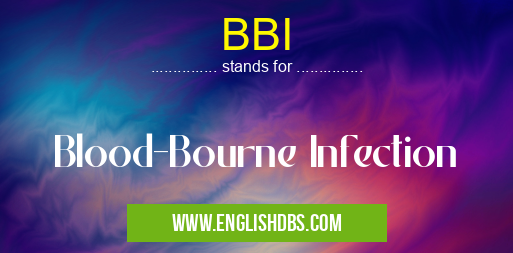What does BBI mean in HOSPITALS
Blood-Borne Infections (BBI) are a broad range of bacterial, viral, fungal, and parasitic infections that can be spread through contact with contaminated blood. These infections can have serious health consequences if left untreated. Understanding the symptoms, modes of transmission, and available treatments is key to preventing and treating these infections.

BBI meaning in Hospitals in Medical
BBI mostly used in an acronym Hospitals in Category Medical that means Blood-Bourne Infection
Shorthand: BBI,
Full Form: Blood-Bourne Infection
For more information of "Blood-Bourne Infection", see the section below.
Definition
Blood-Borne Infections (BBI) are a wide range of bacterial, viral, fungal, and parasitic diseases that can be spread via contact with infected blood. Blood-borne viruses such as HIV, Hepatitis B and C virus are serious global health issues that require lifelong treatment and management to avoid severe consequences. Furthermore, other types of blood-borne pathogens such as the Mycobacterium tuberculosis bacteria or malaria parasites are also considered BBIs in certain contexts.
Modes of Transmission
The primary mode of transmission for many BBIs is contact with infected bodily fluids including blood, semen or vaginal secretions during unprotected sexual intercourse or drug use involving shared needles. There have been documented cases of hospital personnel being infected by contaminated medical equipment as well. Blood transfusions from an infected donor may also lead to BBI infection in patients receiving donated blood products. Additionally, in rare cases household contacts may become infected from exposures to an ill individual in the home setting.
Prevention & Treatment
Preventing the transmission of these illnesses involves practicing safe sex (use condoms), avoiding sharing needles (for injection drug use), being aware of potential contagion during medical procedures, getting tested for sexually transmitted diseases before engaging in any type of sexual activity and using appropriate protective gear when caring for individuals who are already known to harbor one of these infectious agents (i.e., gloves). Treatment depends on the type of BBI infection and typically involves antibiotics or antiviral drugs for bacterial or viral infections respectively A combination therapy may also be employed depending on the severity and duration of symptoms.
Essential Questions and Answers on Blood-Bourne Infection in "MEDICAL»HOSP"
What is a Blood-Borne Infection?
A Blood-Borne Infection, or BBI, is an infection that is spread through contact with the blood of an infected person. BBIs are caused by bacteria, viruses and other organisms that can travel from person to person through the exchange of contaminated blood.
How does a Blood-Borne Infection spread?
A Blood-Borne Infection can be spread through direct contact with the blood or body fluids of an infected individual. This includes sexual contact, sharing needles to inject drugs, transfusions and organ transplants using infected blood, or exposure to contaminated medical equipment or surfaces.
What are some common symptoms of a Blood-Borne Infection?
The symptoms of a BBI can vary depending on the organism causing the infection. Common symptoms include fever, fatigue, joint pain and swelling, nausea and vomiting, rash, shortness of breath and difficulty breathing. In some cases there may be no visible signs or symptoms at all.
Who is at risk for contracting a Blood-Borne Infection?
People who are at increased risk for contracting a BBI include those who have had unprotected sex with multiple partners; those who use intravenous drugs; those who have received transfusions or organ transplants; healthcare workers; people in close contact with an infected individual; and infants born to mothers who are carriers of a BBI.
How can one reduce their risk for contracting a Blood-Bourne Infection?
To reduce your risk for contracting a BBI it is important to practice safe sex by using condoms during intimate activity with multiple partners. Additionally abstaining from drug use and avoiding contact with individuals who you know are ill can help prevent contraction of a BBI.
How is a Blood-Bourne Infection diagnosed?
Diagnosis of a BBI typically involves testing for antibodies produced as your body's response to the virus or other organism causing infection. It may also require additional tests to identify the specific infectious agent associated with illness so treatment plan can be tailored appropriately.
What treatments might be used for infections due to these organisms?
Treatment plans vary based on each individual case but may include medications such as antiviral drugs and antibiotics depending on which infectious organism has been identified as the cause of illness. Additionally supportive therapies such as rest and hydration may also be recommended when dealing with Symptoms associated with these infections.
What happens if left untreated?
If left untreated some BBIs can cause severe damage over time leading to life threatening complications such as organ failure pneumonia meningitis stroke sepsis or shock. Additionally without proper treatment some infections may become chronic long after initial exposure.
Final Words:
Blood-Borne Infections (BBI) is a broad group of infectious diseases caused by bacteria, viruses, fungi or parasites that can be transmitted through contact with contaminated blood or other bodily fluids such as semen or vaginal secretions. Prevention methods include avoiding unprotected sex, needle sharing practices and taking appropriate safety measures when caring for someone known to have this type of illness. Proper diagnosis and timely treatment are essential for successful management; however long term care may be required depending on the nature and severity of the infection.
BBI also stands for: |
|
| All stands for BBI |
